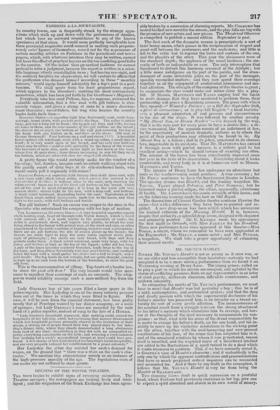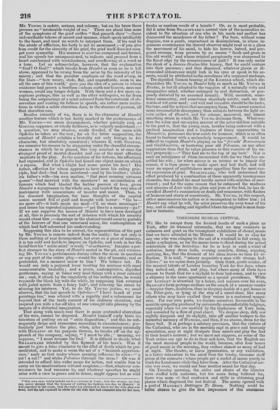MR. YOUNG'S HAMLET.
EITHER Mr. YOUNG.S Hamlet is not so young as it once was, or we are older and less susceptible than heretofore : certainly we had imagined it to be a more moving performance than we found it on Wednesday evening at Drury-Lane. The young prince, called on to play a part to which his nerves are unequal, and agitated by the storm of conflicting passions, finds no apt representative in an actor of staid gravity, deliberate elocution, inflexible countenance, and uniform solemnity. In estimating the merits of Ir. YOI7NG'S performance, we must bear in mind that Hamlet was but yesterday a boy ; that he is of a mild, contemplative, and sentimental genius ; and that the deep and deadly passion with which the supernatural disclosure of his father's murder has possessed him, is an intruder on a breast naturally the seat of every gentle affection. The inconsistencies of his conduct result from a struggle between the strong attachment to his father's memory which stimulates him to revenge, and horror at the thoughts of the deed necessary to consummate his vengeance: so that, what with his sense of the dread responsibility he is under to avenge his father's death, on the one hand, and his inability to screw up his vindictive resolutions to the sticking-point on the other, together with the soul-harrowing and ever-present recollections of his loss, of the crime that has subjected him to it, and of the unnatural relatives by whom it was perpetrated, reason itself is unsettled, and the wayward starts of a disordered intellect are added to the fluctuations of a spirit tasked to do a deed which it wants sternness to perform. This, if we have correctly stated it, IS GOETHE'S view of Hamlet's character; and it undoubtedly is the only one by which the apparent contradictions and procrastinations that have so much perplexed critical inquirers can be reconciled and accounted for. And if there be any truth in the conception, it follows that Mr. YOUNG'S Hamlet is very far from being the Hamlet of SHARK, EARE.
Two stunning blows dealt in quick succession on a youthful head, which Fortune had previously cherished in her lap, give one to expect a spirit absorbed and absent in its own world of misery. Mr. YOUNG is sedate, serious, and solemn ; but on his brow there presses no " intolerable weight of wo." There are about him none of the symptoms of the grief within " that passeth show "—those indescribable tokens of accent and manner, which speak intelligibly to the heart, and need no words to interpret them. If his soul be the abode of affliction, his body is not its monument ;—if you give him credit for the sincerity of his grief, the grief itself does not compel your sympathy. His manner is ever too composed and formal, and his speech too unimpassioned, to indicate and proceed from a heart surcharged with wretchedness, and overflowing at a word or a tone. Let us acknowledge, however, that the exclamation "God! 0 God !" which breaks from Hamlet as soon as he is left alone, appeared to be wrung from the actor by the intensity of his misery ; and that the peculiar emphasis on the word weary, in the lines—" how weary, stale, flat, and unprofitable, seem to me all the uses of this world," gave you the idea of a person to whom existence had grown a burthen—whom earth nor heaven, man nor woman, could any longer delight. With these and a few more exceptions perhaps, this as well as the other soliloquies, so far from being the outpourings of a spirit released from the constraint of observation and venting its fulness in speech, are rather mere recitations in which a noble elocution does, in the absence of passion, all that elocution can.
Besides intensity of wo, there is in the character of Hamlet another feature which is hut feebly marked in the performance of Mr. YOUNG—we mean derangement, whether partially real, as GokeruE supposes, or wholly fictitious, as is vulgarly understood ;a question, we may observe, easily decided, if the scene with Ophelia be taken as the test ; for on the latter supposition, the conduct of Hamlet exhibits a brutality not only foreign to his character, but absolutely unnatural ; whereas if, with GOETHE, we. conceive his reason to be staggering under the dreadful circumstances in which he is placed, this very conduct is at once the strongest proof of mental disorder and one of the most affecting ncidents in the play. In the sunshine of his fortune, his affections had expanded, and in Ophelia had found one object more on which t o repose. But what a blight had come across his love ! His father, affection for whom appears to have been his ruling principle, had died—had been murdered—and by his brother ; whilst his father's wife—his own mother, " that most seeming virtuous queen"—had married with the murderer ! an accumulation of horrors which had blasted the feebler passion of love, given Hamlet a repugnance to the whole sex, and tainted the very idea of matrimony with associations of murder and incest. Thus, to his diseased imagination, the bare thoughts of the nuptial union seemed full of guilt and fraught with horror: "Go to— no more oft—it hath made me mad—I'll no more marriages and hence his repeated injunctions—" get thee to a nunnery—go !" If we can suppose the senses of Hamlet to have been deranged at all, this is precisely the sort of delusion with which his insanity would cheat him ;—marriage in the abstract would seem to partake of the horrors of that one unnatural union, the contemplation of which had half subverted his understanding.
Supposing this idea to be correct, the representation of the part by Mr. YOUNG is remote indeed from the reality : for not only is there nothing of real derangement, but even as a piece of mimicry, it is too cold and feeble to impose on Ophelia, and work in her the belief that his "noble mind" is really "overthrown," Imagine a perfect stranger to the story of Hamlet seated in the pit, and witnessing Mr. YOUNG'S performance during either the scene in question or any part of the entire play—would the idea of insanity, real or pretended, for a moment occur to him ? We believe not. He would see only a perjured lover treating his mistress with most unaccountable brutality ; and a grave, contemplative, dignified gentleman, saying at times very mad things with a most rational air ; and, if struck by the singularity of his nether attire, he would reconcile the black leg with the white, by supposing him returned with jaded spirits from a fancy ball*, and relieving his ennui by abusing his mistress. Yet, to do Mr. YOUNG justice, we must observe, that his last speech to Ophelia—" I have heard of your paintings too," was uttered with a rapidity and a vehemence far beyond that of the tardy current of his ordinary elocution, and inspired you with a far-off idea of one wrought into phrensy by the images of a distorted imagination. That along with much real there is more pretended aberration of the wits, cannot be disputed. Hamlet himself early hints his intention of putting on an " antic disposition ; " and this he subsequently drops and reassumes according to circumstances ; particularly just before the play, when, alter conversing rationally with HORATIO on his purpose therein, he breaks off on the approach of the company, saying, " I must be idle ; " meaning, we suppose, " I must resume the fool." It is difficult to decide what SHAKSPEARE intended by this figment of his hero's. Was it meant to give a false character to the dded of death which he premeditated, and to make it seem the act of a " brainish apprehension," such as that under whose seeming influence he cries—" rat ! a rat !" and sticks Polonius through the arras ? Or was it intended to afford him wider scope for action, and enable him to carry on his machinations without suspicion ;—that, whatever contrivances he had recourse to, and whatever speeches he might utter with a view to prove and-to detect, might appear but as wild freaks or random words of a lunatic ? Or, as is most probable, did it arise from SHAKSPEARE'S correct view of the necessities incident to the situation of one who in his uncle and mother has discovered the murderers of his father? For how, without some disguise, was a youth, unpractised in dissimulation, in whose ingenuous countenance the shrewd observer might read as in a glass the movement of his mind, to hide his horror, hatred, and purposed revenge, from persons by no means "fresh and green in this old world," and whose original perspicacity was sharpened to the finest edge by the consciousness of guilt? It was only under the cloak of a Junius-Brutus-like lunacy, that he could venture into their presence ; and thus disguised, whatever gloom or illconcealed abhorrence might lurk in his eyes or speak in his accents, would be attributed to the moodiness of a supposed madman. The dignified 'Roman bearing of the KEMBLE school, which distinguishes Mr. YOUNG in Hamlet fully as much as Mr. YOUNG in Brutus,. is but ill adapted to the vagaries of a naturally witty and imaginative mind, whether unhinged by real distraction, or purposely distorted by an assumed insanity. Wild, eccentric, sometimes unmeaning, and sometimes singularly astute, such are the words of wit gone mad ; and wild and eccentric should be the looks, the tone, and the actions that accompany them. We cannot conceive more irreconcilable discrepancy than subsists between the light erratic sallies of Hamlet, and the solemn; measured, and almost mouthing strain in which Mr. YOUNG declaims them. What renders the sober and unvarying manner of the actor still less suitable to the part is, that the young man, besides being endowed with a poetical imagination and a liveliness of fancy approaching to ..41ereutio's, possesses the true relish for humour, which is so often found to harbour with a melancholy temperament. It would be difficult to explain Hamlet's playing on his "friends" Rosencrantz and Guildenstern, or bantering poor old Polonius, on any other supposition than that he takes pleasure in this exercise of his native propensity:—" They fool me to the top of my bent." Nor is such an indulgence of whim inconsistent with the wo that has unsettled his wits ; for when misery is so intense as to impair the reason, it is then prone to make sport and bait itself, and will wear an aspect of mirthfulness more appalling than the most rueful expression of grief. SHAKSPEARE, who well understood the effect produced by a combination of these apparently incongruous elements, has dashed his most terrific scenes with snatches of merriment; and for the same reason that he enhanced the madness and miseries of Lear with the gibes and jests of the fool, he has diversified Hamlet's rumination on death and vengeance, with flashes of humour and starts of eccentricity. Mr. YOUNG, in this respect, either misconceives his author or is incompetent to follow him : let Hamlet say what he will, the actor preserves the even tenor of his way, and is unbending and dignified where his original is most familiar or fantastic.



















 Previous page
Previous page